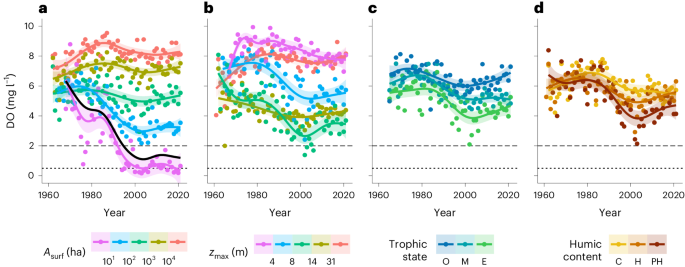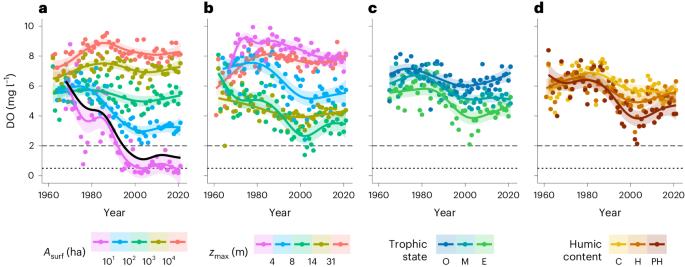Climate-driven deoxygenation of northern lakes
IF 29.6
1区 地球科学
Q1 ENVIRONMENTAL SCIENCES
引用次数: 0
Abstract
Oxygen depletion constitutes a major threat to lake ecosystems and the services they provide. Most of the world’s lakes are located >45° N, where accelerated climate warming and elevated carbon loads might severely increase the risk of hypoxia, but this has not been systematically examined. Here analysis of 2.6 million water quality observations from 8,288 lakes shows that between 1960 and 2022, most northern lakes experienced rapid deoxygenation strongly linked to climate-driven prolongation of summer stratification. Oxygen levels deteriorated most in small lakes (<10 ha) owing to their greater volumetric oxygen demand and surface warming rates, while the largest lakes gained oxygen under minimal stratification changes and improved aeration at spring overturns. Seasonal oxygen consumption rates declined, despite widespread browning. Proliferating anoxia enhanced seasonal internal loading of C, P and N but depleted P long-term, indicating that deoxygenation can exhaust redox-sensitive fractions of sediment nutrient reservoirs. The changing climate threatens water quality in lakes, particularly oxygen levels. Here the authors present evidence for northern lakes of rapidly reducing oxygen levels, mainly driven by longer stratification in the warm season, with implications for lake ecosystems.


气候导致北方湖泊脱氧
氧气耗竭是湖泊生态系统及其所提供服务的主要威胁。世界上大多数湖泊位于北纬 45°,气候加速变暖和碳负荷增加可能会严重增加缺氧风险,但这一问题尚未得到系统研究。本文对来自 8288 个湖泊的 260 万个水质观测数据进行了分析,结果表明,在 1960 年至 2022 年期间,大多数北方湖泊都经历了快速脱氧,这与气候导致的夏季分层时间延长密切相关。小湖泊(10 公顷)的氧气水平恶化最严重,因为它们的体积需氧量更大,湖面升温速度也更快,而最大的湖泊则在最小的分层变化和春季翻腾时通气条件改善的情况下获得了氧气。尽管湖水普遍变褐,但季节性耗氧率却有所下降。增殖性缺氧提高了 C、P 和 N 的季节性内部负荷,但长期消耗了 P,这表明脱氧可耗尽沉积物营养库中对氧化还原敏感的部分。
本文章由计算机程序翻译,如有差异,请以英文原文为准。
求助全文
约1分钟内获得全文
求助全文
来源期刊

Nature Climate Change
ENVIRONMENTAL SCIENCES-METEOROLOGY & ATMOSPHERIC SCIENCES
CiteScore
40.30
自引率
1.60%
发文量
267
审稿时长
4-8 weeks
期刊介绍:
Nature Climate Change is dedicated to addressing the scientific challenge of understanding Earth's changing climate and its societal implications. As a monthly journal, it publishes significant and cutting-edge research on the nature, causes, and impacts of global climate change, as well as its implications for the economy, policy, and the world at large.
The journal publishes original research spanning the natural and social sciences, synthesizing interdisciplinary research to provide a comprehensive understanding of climate change. It upholds the high standards set by all Nature-branded journals, ensuring top-tier original research through a fair and rigorous review process, broad readership access, high standards of copy editing and production, rapid publication, and independence from academic societies and other vested interests.
Nature Climate Change serves as a platform for discussion among experts, publishing opinion, analysis, and review articles. It also features Research Highlights to highlight important developments in the field and original reporting from renowned science journalists in the form of feature articles.
Topics covered in the journal include adaptation, atmospheric science, ecology, economics, energy, impacts and vulnerability, mitigation, oceanography, policy, sociology, and sustainability, among others.
 求助内容:
求助内容: 应助结果提醒方式:
应助结果提醒方式:


